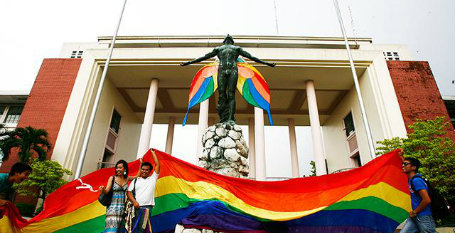This is very special and better than other ordinances (and) there is also affirmative action,” said Ging Cristobal, project coordinator for the Asia Pacific region of the International Gay and Lesbian Human Rights Commission and vice chairperson of the Quezon City Pride Council, according to gmanetwork.com.
Quezon City, popularly known to Filipinos as QC, is one of the cities that make up Metro Manila, the National Capital Region of the Philippines.
The ordinance was passed unanimously Sept 29 after a marathon eight-hour session attended by more than 30 city councilors, Cristobal told GMA News Online.
Cristobal’s group is among those who lobbied for the ordinance that prohibits discrimination in terms of employment, education, delivery of goods or services, insurance and access to accommodations.
It also expands a 2003 resolution that centered on discrimination of gay people in terms of employment only. That Quezon City ordinance, the first passed in the Philippines protected the rights of lesbian, gay, bisexual, transgender people against discrimination in the workplace.
The QC-wide ordinance also provides venues to educate employers and educators on the rights of LGBT individuals. Establishments will also be directed to designate a restroom that can be used by all genders, regardless of sexual orientation and gender identity or expression.
Cristobal described the new law as a landmark city ordinance, the first of its kind in Metro Manila.
Earlier, in an interview with Outrage magazine, the only LGBT magazine in the Philippines, QC Vice Mayor Joy Belmonte highlighted the importance of an ordinance that will protect the rights of LGBT individuals.
“There are many LGBT [people] in our city, and I believe they are such a strong and important force in our city’s progress and development,” Belmonte said. “There’s so much they can do for the city if we help them,” she added.
Cristobal pointed out that though the ordinance was formulated with the rights of the LGBT community in mind, it is useful to everyone in the community, regardless of sexual orientation or gender identity and expression.
The ordinance will be implemented after Implementing Rules and Regulations are drafted by the city.
Several of the larger cities in the Philippines have passed ordinances banning LGBT discrimination, but efforts to pass a national law continues to be blocked and that hate crimes against the LGBT community remain a distressing threat, advocates say.
Source: gmanetwork.com
This is very special and better than other ordinances (and) there is also affirmative action,” said Ging Cristobal, project coordinator for the Asia Pacific region of the International Gay and Lesbian Human Rights Commission and vice chairperson of the Quezon City Pride Council, according to gmanetwork.com.
Quezon City, popularly known to Filipinos as QC, is one of the cities that make up Metro Manila, the National Capital Region of the Philippines.
The ordinance was passed unanimously Sept 29 after a marathon eight-hour session attended by more than 30 city councilors, Cristobal told GMA News Online.
Cristobal’s group is among those who lobbied for the ordinance that prohibits discrimination in terms of employment, education, delivery of goods or services, insurance and access to accommodations.
It also expands a 2003 resolution that centered on discrimination of gay people in terms of employment only. That Quezon City ordinance, the first passed in the Philippines protected the rights of lesbian, gay, bisexual, transgender people against discrimination in the workplace.
The QC-wide ordinance also provides venues to educate employers and educators on the rights of LGBT individuals. Establishments will also be directed to designate a restroom that can be used by all genders, regardless of sexual orientation and gender identity or expression.
Cristobal described the new law as a landmark city ordinance, the first of its kind in Metro Manila.
Earlier, in an interview with Outrage magazine, the only LGBT magazine in the Philippines, QC Vice Mayor Joy Belmonte highlighted the importance of an ordinance that will protect the rights of LGBT individuals.
“There are many LGBT [people] in our city, and I believe they are such a strong and important force in our city’s progress and development,” Belmonte said. “There’s so much they can do for the city if we help them,” she added.
Cristobal pointed out that though the ordinance was formulated with the rights of the LGBT community in mind, it is useful to everyone in the community, regardless of sexual orientation or gender identity and expression.
The ordinance will be implemented after Implementing Rules and Regulations are drafted by the city.
Several of the larger cities in the Philippines have passed ordinances banning LGBT discrimination, but efforts to pass a national law continues to be blocked and that hate crimes against the LGBT community remain a distressing threat, advocates say.
Source: gmanetwork.com

